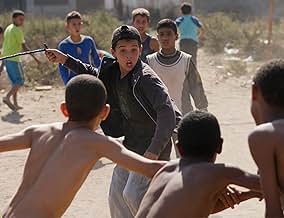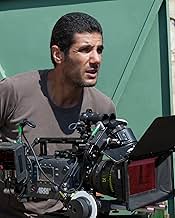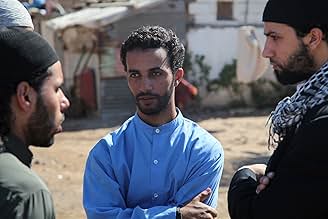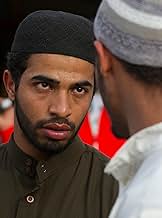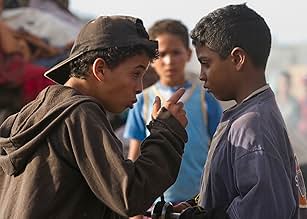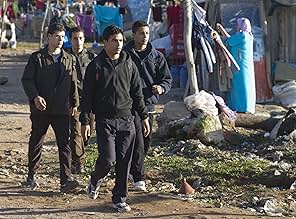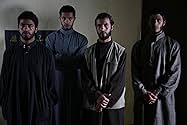AVALIAÇÃO DA IMDb
7,3/10
2,1 mil
SUA AVALIAÇÃO
Adicionar um enredo no seu idiomaA fictional account of the lives of the men responsible for the suicide bombings in Casablanca in 2003.A fictional account of the lives of the men responsible for the suicide bombings in Casablanca in 2003.A fictional account of the lives of the men responsible for the suicide bombings in Casablanca in 2003.
- Direção
- Roteiristas
- Artistas
- Prêmios
- 10 vitórias e 5 indicações no total
Abdelhakim Rachid
- Yachine
- (as Abdelhakim Rachi)
- …
Rabii Benjhail Tadlaoui
- Zaid
- (as Rabii Tadlaoui)
- Direção
- Roteiristas
- Elenco e equipe completos
- Produção, bilheteria e muito mais no IMDbPro
Avaliações em destaque
It shows how easy it is for anyone to be brainwashed If he lives in certain circumstances. I think almost everyone could fall into the same trap if they were in their place with that difficult life. so who should be blamed? them? Or society? Or religion? All religions are myths and i think religion keeps destroying humanity. this movie is very good
I finally found a version of this film that was not dubbed into French! Over the years I have downloaded, rented and started watching it but gave up as the language was not the original Darija.
I watched the film with a sense of mounting horror and despair. There was not a moment of fat in this feature that told the story of various youths and their families' lives in the sprawling slum of Sidi Moumen. The shantytown had been allowed to exist and enlarge during "Les Années de Plomb" (the years of lead) under the careless watch of King Hassan ll. There is no way out apart from crime, prostitution or marriage to a rich person if one is good looking.
We see the lives of the protagonists from childhood through to the atrocities and how they are twisted and formed by the utter hopelessness of their situation. The local Mafias act on behalf of the cops until the latter decide an arrest is needed, then someone is casually thrown in jail. One of these is Hamid, rough elder brother of Tarek who is ensnared by radical Islam in the klink. Unfolding events trap others too, including Tarek and his friends.
There is a theme throughout the film of hidden homosexuality. Nabil is raped as a preteen and is Tarek's lover later when they are teens despite the latter being in love with Ghislaine, a local beauty. The repair shop's boss tries it on with Nabil too and this is the beginning of the lads' descent into fundamentalism. It's quite subtly done in the film. This is Morocco after all and such things are not spoken about.
The radicalisers are grotesquely true to life in their way of caging and channeling their victims into believing that martyrdom while killing apostates and non-Muslims is acceptable, nay desirable. Of course, they would never go on a mission themselves.
The part that made me weep was when the lads were taken on a solidarity holiday to the mountains just before their mission. These young men were not evil, they were kids who had been deluded and deceived, splashing in mountain streams that they had never had the opportunity to see before and playing football. They had been seduced to terrible effect.
And now I have to declare my interest. I live in Morocco although not in Casablanca. The new tramway extends all the way to Sidi Moumen giving new opportunities to the remaining slums. Morocco has clamped down on jihadists using a network of spies and informers. However, I was by chance in Casablanca the night of the attacks, staying in a hotel 200 yards away from the Safir which was partially blown up. Like an idiot, having heard the explosion from my hotel, I went out to see what had happened. I got about 40 yards down the street before I was lifted off my feet by two burly cops and dragged back to my hotel and slapped hard once they had got me into reception.
I was bewildered ever since and have never truly understood the attraction of being radicalised, either these guys or other terrorists elsewhere. This masterpiece of a film goes a long way to explaining the process to me.
I watched the film with a sense of mounting horror and despair. There was not a moment of fat in this feature that told the story of various youths and their families' lives in the sprawling slum of Sidi Moumen. The shantytown had been allowed to exist and enlarge during "Les Années de Plomb" (the years of lead) under the careless watch of King Hassan ll. There is no way out apart from crime, prostitution or marriage to a rich person if one is good looking.
We see the lives of the protagonists from childhood through to the atrocities and how they are twisted and formed by the utter hopelessness of their situation. The local Mafias act on behalf of the cops until the latter decide an arrest is needed, then someone is casually thrown in jail. One of these is Hamid, rough elder brother of Tarek who is ensnared by radical Islam in the klink. Unfolding events trap others too, including Tarek and his friends.
There is a theme throughout the film of hidden homosexuality. Nabil is raped as a preteen and is Tarek's lover later when they are teens despite the latter being in love with Ghislaine, a local beauty. The repair shop's boss tries it on with Nabil too and this is the beginning of the lads' descent into fundamentalism. It's quite subtly done in the film. This is Morocco after all and such things are not spoken about.
The radicalisers are grotesquely true to life in their way of caging and channeling their victims into believing that martyrdom while killing apostates and non-Muslims is acceptable, nay desirable. Of course, they would never go on a mission themselves.
The part that made me weep was when the lads were taken on a solidarity holiday to the mountains just before their mission. These young men were not evil, they were kids who had been deluded and deceived, splashing in mountain streams that they had never had the opportunity to see before and playing football. They had been seduced to terrible effect.
And now I have to declare my interest. I live in Morocco although not in Casablanca. The new tramway extends all the way to Sidi Moumen giving new opportunities to the remaining slums. Morocco has clamped down on jihadists using a network of spies and informers. However, I was by chance in Casablanca the night of the attacks, staying in a hotel 200 yards away from the Safir which was partially blown up. Like an idiot, having heard the explosion from my hotel, I went out to see what had happened. I got about 40 yards down the street before I was lifted off my feet by two burly cops and dragged back to my hotel and slapped hard once they had got me into reception.
I was bewildered ever since and have never truly understood the attraction of being radicalised, either these guys or other terrorists elsewhere. This masterpiece of a film goes a long way to explaining the process to me.
On May 16, 2003, Morocco got "its" September 11. How naïve we were to think ourselves as untouchables, if anything the tragedy was a humbling lesson and Morocco's secret services could reinvent their methods in order to nip in the bud terrorist actions. Who needs to be as effective as the Mossad or Scotland Yard when any Moroccan can be a potential informant (an entire cell could be dismantled simply because the building's janitor found suspicious that one man living alone could buy so much bread at once). Anyway, the shock faded with time or switched to other cities such as Madrid in 2004 or London in 2005, what was left from the bombings were anecdotes such as "where were you when it happened?" "I thought it was fireworks".
Still, when I got a job and started enjoying Casablanca's nighttime, I often wondered what if it happened to me... I guess I'm lucky to never have been in the wrong place at the wrong time. But Nabil Ayouch's angle is interesting: adapting Mahi Binebine's "Stars of Sidi Moumen" novel, he exposes terrorists as those born in the wrong place at the wrong time. The place was Sidi Moumen, a Moroccan favela, the wrong time was the aftermath of September 11 that ignited a fire of anger in souls who kept their frustration for too long, and resentment is an excellent combustible.
His movie ends right before the explosion, because whatever happens after was a human tragedy written by statistics, Ayouch is digging deeper, within the psyche of a disillusioned unemployed kid, willing to kill and die. How he doesn't see his victims as innocent is the greatest trick extremism can operate on weak souls, but are their weakness to blame? Ayouch is interested in the human side of outcasts, humanity as vulnerability. In a way, terrorists are the first victims of terrorism. Ayouch doesn't side with them but in "Horses of God" he depicts a sort of life that was so hellish that only the existence of an afterlife for the 'righteous' ones could make it tolerable. People's opium.
The film opens with "City of God" (or Allah) vibes. Boys play football, Tarek aka Yachine is the goalkeeper. They could be my age, I was 12 in 1994. The colors are yellowish and bright, it's childhood, life... but what do they do for a living? Taking stuff from a dump (one of the biggest in the area) and then resell it. When Tarek and Nabil are teased by two kids for their closeness, Tarek's brother Habib come with an improvised chain-like weapon and bomb them with insults that would make an adult weep. Habib is the most resourceful and natural leader, his mother treats him like the man of the house. Indeed with one brother who's stuck to the same corner with an old transistor and a mentally challenged father, we gather that neither Habib or Tarek grew up with models to look up to.
In this time and place, if you didn't become a football player or got yourself on the other side of the Mediterranean sea, your only options were selling fruit or vegetables, being a mechanic or forgetting lost dreams through a certain Moroccan 'plant' to blend with tobacco. Tarek lacked prospects and his brother's magnetism but somehow manages to grow up as a reasonable (albeit irritable) man played by Abdelhakim Rachid, he's Nabil's best friend and is in love with one of the girls from the neighborhood.
Speaking of Nabil (Hamza Souidek), his family background consists of a mother who dances at weddings, which in Moroccan perception equals a prostitute. But never sugarcoating his material, in quite a gut-wrenching scene we see Nabil being abused by Habib... during the childhood part. I was perplex about that scene but I guess Ayouch wanted to show a certain reality about religious people: they have a shady past, some traumas or guilt-inducing factors to make up to. Many praying and dutiful Muslims I knew lead the kind of youths that make mine feel like priesthood.
Ultimately, Habib (Abdelilah Rachid) becomes a delinquent and ends up in jail after a police incident. Both Tarek and Nabil work as mechanic assistants and do quite well. In one of the film's most lighthearted scenes the two drive one of these popular Moroccan motorbikes to get to Rizlene. It's like the two friends riding their white horse in De Sica's "Shoeshine". But Tarek can't talk to her, she's chaperoned by her brother Fouad (Ahmed el-Idrissi Amrani) who'll eventually be part of the terrorist group. Things escalate at Habib's return. He's bearded, talks like a sect guru and the mother is so admirative of him she doesn't even notice the change. Tarek does and doesn't like it. But one incident gives the religious group the opportunity to 'get' them..
From his "Ali Zaoua" to "Much Loved", 'group power' has been a source of inspiration for Ayouch. Maybe that is the real clash of civilization, more than obscurantism vs modernity, it's about the group versus the individual: society encourages us to speak our voices, which Tarek does all along, until he just finds the so awaited inner peace in masculine bonding and collective prayers. But in an ironic twist, as the day of the attack approaches, it's Habib who got cold feet. It was interesting to have that particular insight, we tend to look at these criminals like brainwashed zombies, but how many wanted to leave but couldn't. As for Tarek, even the memory of Rizlene was swept off by the prospects of having plenty of them in the afterlife. Groups again.
"Horses of God" traces the uncompromising road toward that fateful night where kids playing football in Sidi Moumen "saw fireworks" in Casa. At that point, innocent people were dead... as for the terrorists, somehow they were dead already, their fates echoing that line from Alan Parker's "Mississippi Burning" I paraphrased in the title.
On May 16, it was Casablanca burning.
Still, when I got a job and started enjoying Casablanca's nighttime, I often wondered what if it happened to me... I guess I'm lucky to never have been in the wrong place at the wrong time. But Nabil Ayouch's angle is interesting: adapting Mahi Binebine's "Stars of Sidi Moumen" novel, he exposes terrorists as those born in the wrong place at the wrong time. The place was Sidi Moumen, a Moroccan favela, the wrong time was the aftermath of September 11 that ignited a fire of anger in souls who kept their frustration for too long, and resentment is an excellent combustible.
His movie ends right before the explosion, because whatever happens after was a human tragedy written by statistics, Ayouch is digging deeper, within the psyche of a disillusioned unemployed kid, willing to kill and die. How he doesn't see his victims as innocent is the greatest trick extremism can operate on weak souls, but are their weakness to blame? Ayouch is interested in the human side of outcasts, humanity as vulnerability. In a way, terrorists are the first victims of terrorism. Ayouch doesn't side with them but in "Horses of God" he depicts a sort of life that was so hellish that only the existence of an afterlife for the 'righteous' ones could make it tolerable. People's opium.
The film opens with "City of God" (or Allah) vibes. Boys play football, Tarek aka Yachine is the goalkeeper. They could be my age, I was 12 in 1994. The colors are yellowish and bright, it's childhood, life... but what do they do for a living? Taking stuff from a dump (one of the biggest in the area) and then resell it. When Tarek and Nabil are teased by two kids for their closeness, Tarek's brother Habib come with an improvised chain-like weapon and bomb them with insults that would make an adult weep. Habib is the most resourceful and natural leader, his mother treats him like the man of the house. Indeed with one brother who's stuck to the same corner with an old transistor and a mentally challenged father, we gather that neither Habib or Tarek grew up with models to look up to.
In this time and place, if you didn't become a football player or got yourself on the other side of the Mediterranean sea, your only options were selling fruit or vegetables, being a mechanic or forgetting lost dreams through a certain Moroccan 'plant' to blend with tobacco. Tarek lacked prospects and his brother's magnetism but somehow manages to grow up as a reasonable (albeit irritable) man played by Abdelhakim Rachid, he's Nabil's best friend and is in love with one of the girls from the neighborhood.
Speaking of Nabil (Hamza Souidek), his family background consists of a mother who dances at weddings, which in Moroccan perception equals a prostitute. But never sugarcoating his material, in quite a gut-wrenching scene we see Nabil being abused by Habib... during the childhood part. I was perplex about that scene but I guess Ayouch wanted to show a certain reality about religious people: they have a shady past, some traumas or guilt-inducing factors to make up to. Many praying and dutiful Muslims I knew lead the kind of youths that make mine feel like priesthood.
Ultimately, Habib (Abdelilah Rachid) becomes a delinquent and ends up in jail after a police incident. Both Tarek and Nabil work as mechanic assistants and do quite well. In one of the film's most lighthearted scenes the two drive one of these popular Moroccan motorbikes to get to Rizlene. It's like the two friends riding their white horse in De Sica's "Shoeshine". But Tarek can't talk to her, she's chaperoned by her brother Fouad (Ahmed el-Idrissi Amrani) who'll eventually be part of the terrorist group. Things escalate at Habib's return. He's bearded, talks like a sect guru and the mother is so admirative of him she doesn't even notice the change. Tarek does and doesn't like it. But one incident gives the religious group the opportunity to 'get' them..
From his "Ali Zaoua" to "Much Loved", 'group power' has been a source of inspiration for Ayouch. Maybe that is the real clash of civilization, more than obscurantism vs modernity, it's about the group versus the individual: society encourages us to speak our voices, which Tarek does all along, until he just finds the so awaited inner peace in masculine bonding and collective prayers. But in an ironic twist, as the day of the attack approaches, it's Habib who got cold feet. It was interesting to have that particular insight, we tend to look at these criminals like brainwashed zombies, but how many wanted to leave but couldn't. As for Tarek, even the memory of Rizlene was swept off by the prospects of having plenty of them in the afterlife. Groups again.
"Horses of God" traces the uncompromising road toward that fateful night where kids playing football in Sidi Moumen "saw fireworks" in Casa. At that point, innocent people were dead... as for the terrorists, somehow they were dead already, their fates echoing that line from Alan Parker's "Mississippi Burning" I paraphrased in the title.
On May 16, it was Casablanca burning.
The cinematic piece offers a breath of fresh air when it comes to the stigmatized dehumanization of muslim youth, and brings to light the root of the issue instead of the unreconsilable outcome.
This movie creates a back story about the people responsible for the terrorist attacks in Casablanca in the 2000s. Those are real events but the movie doesn't really deal with them per say.
The movie focuses on a rendition (best guess account) of the lives of the terrorists starting at early age and up until that fateful day. It is a movie that tries to explore life and hope and struggle. It aims to give a perspective behind the act. Movies like CITY OF GOD and TSOTSI did the same for criminals, while this one deals with terrorists essentially.
I loved the early parts of the movie, but as it progressed it became very obvious and predictable, outside of the real events that are well known. The things it used artistic vision for, those were completely see through and predictable, and that is a huge problem for any production. As viewers we have to put it through a litmus test and not give it a free pass because of the subject matter; a movie should stand on its own script regardless what it is about.
The story starts great, showing us the early life of the main protagonists i would say from around age 8, keeping in mind one brother is decently older than the other. Those growing up parts, are a great exploratory story, almost a documentary (made up one) on their own. Because the movie spans around 20 years a lot takes place, a lot changes, including the cast. Many movie years later we enter the part where we transition from that childhood story into adulthood story and the radicalization part of the movie. This is where things begin to bog down big time.
I have to say it feels like two different movies and i did not enjoy the second part. I felt that it was incomplete. I don't know, maybe the writers and producer were trying to thread carefully with the issue but watching this movie, i do not see the radicalization they wanted to show. It does not hit home. There is no energy behind it. If anything, i expected the movie to play out with the kids we saw become crime king pins; no really. That's how they set it up. The shift towards religion is not portrayed well. The scenes that we get are i'm sorry to have to say that, really low energy and acted out subpar. Monotone is a simple catch all summary. Now i understand something about inner peace and calm in the face of eventual suicide, but the motivation of becoming a "horse" is not shown here. They wanted to show the gradual path towards the final act, yet from first adult scene to credits, there is no change. They act the same, do the same. There is no curve. It just becomes it. Over and over the same thing scene after scene. Same scene content, different movie month. But there is nothing behind them to show escalation or real increase of commitment or anything at all really. The viewer eventually walks away with nothing gained on the subject as credits roll.
For a movie whose purpose was to tell us how bad life, hopelessness, poverty, corruption push people towards what they can find solace in (whether good or evil) it does not achieve this purpose. If anything from what it showed, those boys should have never become radicalized because the content they used was not there for that to occur. Again i understand it could be self censored for variety of reasons but still, how can you deliver half a movie that captivates the viewer with their earlier life and turn it into nothingness in arguably the vital parts?
To me they really couldn't put into script what they wanted to do here. I keep saying that i cannot tell if that is on purpose or due to faults but ultimately does it really matter? If you make a movie about such a subject, you have to have a very clear vision of how you will proceed at all stages. This is not a moral story or a judgement story either. The movie does not plant thoughts about right or wrong. It just makes an account of what they think happened based on the location and time the movie covers ( 1980s-2000s Marocco slums). They could have done so much more with that. The connection between childhood and adulthood is completely missing, the duality between family and friends is very shallow. There are few scenes that somewhat attempt to show the protagonists manifesting how they have changed on those around them, but they are so generic and completely arbitrary and reasonable for somebody in a muslim country they do not even stand out as events. I watched it twice and i just cannot find the radicalization process they wanted to show. They simply failed to cover that properly. This is why this movie feels so bland at the end.
As a last thought, one thing it did do, is it did cover how poor and low educated people are exploited by others for their purpose. That is the one thing it did deliver on properly. Which again is extremely generic and it applies to a lot of things in life and not exclusive to the situation in this movie. Every time i try to give the movie credit, i really cannot. The thing i just praised it for, i discounted it at the same time. And that is just the situation here. Once you press on the sensitive aspects, HORSES OF GOD has nothing to push back with.
7/10 only because of early story and captivating start.
The movie focuses on a rendition (best guess account) of the lives of the terrorists starting at early age and up until that fateful day. It is a movie that tries to explore life and hope and struggle. It aims to give a perspective behind the act. Movies like CITY OF GOD and TSOTSI did the same for criminals, while this one deals with terrorists essentially.
I loved the early parts of the movie, but as it progressed it became very obvious and predictable, outside of the real events that are well known. The things it used artistic vision for, those were completely see through and predictable, and that is a huge problem for any production. As viewers we have to put it through a litmus test and not give it a free pass because of the subject matter; a movie should stand on its own script regardless what it is about.
The story starts great, showing us the early life of the main protagonists i would say from around age 8, keeping in mind one brother is decently older than the other. Those growing up parts, are a great exploratory story, almost a documentary (made up one) on their own. Because the movie spans around 20 years a lot takes place, a lot changes, including the cast. Many movie years later we enter the part where we transition from that childhood story into adulthood story and the radicalization part of the movie. This is where things begin to bog down big time.
I have to say it feels like two different movies and i did not enjoy the second part. I felt that it was incomplete. I don't know, maybe the writers and producer were trying to thread carefully with the issue but watching this movie, i do not see the radicalization they wanted to show. It does not hit home. There is no energy behind it. If anything, i expected the movie to play out with the kids we saw become crime king pins; no really. That's how they set it up. The shift towards religion is not portrayed well. The scenes that we get are i'm sorry to have to say that, really low energy and acted out subpar. Monotone is a simple catch all summary. Now i understand something about inner peace and calm in the face of eventual suicide, but the motivation of becoming a "horse" is not shown here. They wanted to show the gradual path towards the final act, yet from first adult scene to credits, there is no change. They act the same, do the same. There is no curve. It just becomes it. Over and over the same thing scene after scene. Same scene content, different movie month. But there is nothing behind them to show escalation or real increase of commitment or anything at all really. The viewer eventually walks away with nothing gained on the subject as credits roll.
For a movie whose purpose was to tell us how bad life, hopelessness, poverty, corruption push people towards what they can find solace in (whether good or evil) it does not achieve this purpose. If anything from what it showed, those boys should have never become radicalized because the content they used was not there for that to occur. Again i understand it could be self censored for variety of reasons but still, how can you deliver half a movie that captivates the viewer with their earlier life and turn it into nothingness in arguably the vital parts?
To me they really couldn't put into script what they wanted to do here. I keep saying that i cannot tell if that is on purpose or due to faults but ultimately does it really matter? If you make a movie about such a subject, you have to have a very clear vision of how you will proceed at all stages. This is not a moral story or a judgement story either. The movie does not plant thoughts about right or wrong. It just makes an account of what they think happened based on the location and time the movie covers ( 1980s-2000s Marocco slums). They could have done so much more with that. The connection between childhood and adulthood is completely missing, the duality between family and friends is very shallow. There are few scenes that somewhat attempt to show the protagonists manifesting how they have changed on those around them, but they are so generic and completely arbitrary and reasonable for somebody in a muslim country they do not even stand out as events. I watched it twice and i just cannot find the radicalization process they wanted to show. They simply failed to cover that properly. This is why this movie feels so bland at the end.
As a last thought, one thing it did do, is it did cover how poor and low educated people are exploited by others for their purpose. That is the one thing it did deliver on properly. Which again is extremely generic and it applies to a lot of things in life and not exclusive to the situation in this movie. Every time i try to give the movie credit, i really cannot. The thing i just praised it for, i discounted it at the same time. And that is just the situation here. Once you press on the sensitive aspects, HORSES OF GOD has nothing to push back with.
7/10 only because of early story and captivating start.
Você sabia?
- CuriosidadesOfficial submission of Morocco to the Oscars 2014 best foreign language film category.
- Trilhas sonorasGouli je t'aime
by Youmni Rabii & City 16
Lyricst & Composer - Youmni Abdellatif
Les chevaux de Dieu (Bande originale du film)
©Les Films du Nouveau Monde, 2013
Principais escolhas
Faça login para avaliar e ver a lista de recomendações personalizadas
- How long is Horses of God?Fornecido pela Alexa
Detalhes
- Data de lançamento
- Países de origem
- Idiomas
- Também conhecido como
- Horses of God
- Locações de filme
- Empresas de produção
- Consulte mais créditos da empresa na IMDbPro
Bilheteria
- Orçamento
- US$ 3.000.000 (estimativa)
- Faturamento bruto nos EUA e Canadá
- US$ 14.817
- Fim de semana de estreia nos EUA e Canadá
- US$ 2.251
- 18 de mai. de 2014
- Faturamento bruto mundial
- US$ 96.277
- Tempo de duração1 hora 55 minutos
- Cor
- Mixagem de som
- Proporção
- 1.85 : 1
Contribua para esta página
Sugerir uma alteração ou adicionar conteúdo ausente

Principal brecha
By what name was Os Cavalos de Deus (2012) officially released in India in English?
Responda

